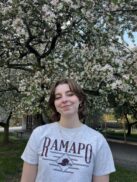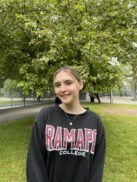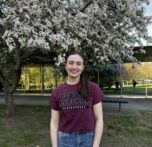- About Ramapo
- Academics
- Admissions & Aid
- Student Life
- Athletics
- Alumni
- Arts & Community
- Quick Links
- Apply
- Visit
- Give
FYS Courses by Topic and Section ID
HNRS 101-01 - Arts and Crisis
Mondays, Wednesdays, & Thursdays, 9:55 – 11:05 a.m.
CRN 41108
Peter A. Campbell
Professor of Theater History & Criticism
As our world deals with multiple crises, what is the role of the arts? This course will explore the ways that crisis has inspired art and how the arts have helped in times of crisis from ancient Greek drama to Beyonce’s Lemonade, from cave paintings to Netflix videos. Through contemporary and historical examples from visual arts, film, media, music, and theater, we will examine how art and artists thrive in times of crisis and help us cope with radical change.
Peer Facilitator
HNRS 101-02 - Power and Place in a New York City Suburb
Tuesdays & Fridays, 11:50 a.m. – 1:35 p.m.
CRN 40558
David Colman
Associate Professor of African American History
This course examines efforts to build community in the diverse city of Englewood New Jersey. We will examine how various racial, ethnic, and religious groups have developed a sense of “Place” and the role of “Place” in community formation. We will think about how the city’s surroundings shape the residents’ identities, politics, and community building efforts. We will explore how race, class, religion and ethnicity have shaped the geography of the city, its politics, its culture, economy, and its rich history. We will think about how block associations, houses of worship, nonprofits, schools, and fraternal organizations seek to build community. We will explore how environmental activists, and government officials incorporate residents’ understanding of their local neighborhoods and its “non-human spaces” into planning decisions. And we will pay particular attention to the current challenges Englewood faces from climate change and development and its impact on the city’s various communities.
Peer Facilitator
HNRS 101-03 - The History of Everything
Wednesdays 9:00 a.m. – 12:30 p.m.
CRN 41277
Tae Kwak
Associate Professor of History
The founding document of the United States declares our natural rights include “Life, Liberty and the pursuit of Happiness.” But how do we pursue happiness? What does that even mean? On a primal level, humans seek meaning and significance, including origins. According to Socrates, the freedom and vocabulary to pursue meaning is fundamental to a “life worth living.” The study of history is a study of origins, but it is also a guide for the future. The past never changes, but what we need — personally, nationally, globally — from the past in order to make the best decisions for the present and for our future, changes with our circumstances. That is why we always need new stories of the past, relevant histories for our present.
Peer Facilitators
Copyright ©2026 Ramapo College Of New Jersey | Statements And Policies | Accessibility | Contact Webmaster.




Follow Ramapo